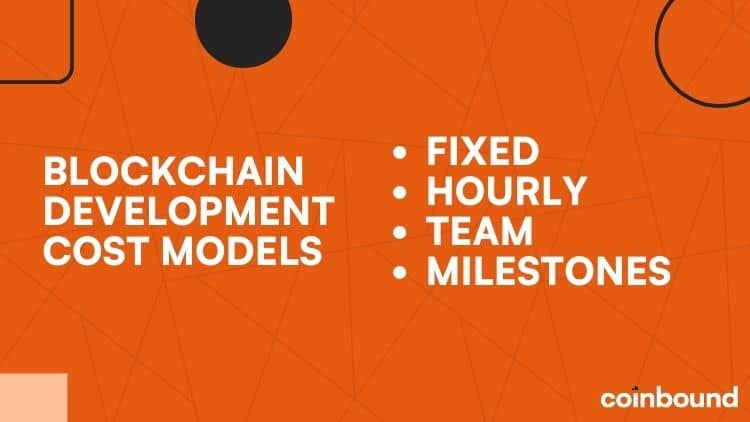Blockchain technology has rapidly evolved from being the backbone of cryptocurrency to becoming an essential tool for businesses across various industries. As blockchain use cases diversify—ranging from supply chain management and healthcare to decentralized finance (DeFi) and non-fungible tokens (NFTs)—the need for specialized blockchain development agencies has soared.
For businesses looking to venture into blockchain or Web3 development, one of the most common questions is: how much do blockchain development companies cost?
In this blog post, we’ll explore the cost factors, typical pricing models, and key considerations to help you understand what to expect when hiring a blockchain development company or agency.
What Determines the Cost of Blockchain Development?
The cost of blockchain development can vary significantly depending on several factors. Below are the key determinants that will impact your budget when working with a blockchain development company:
1. Type of Blockchain Project
The complexity and scope of your project is the most important factor influencing the cost. Blockchain projects can vary widely, and so do their development requirements:
- Smart Contracts: If you need a simple smart contract on Ethereum, this will cost far less than developing a custom blockchain or decentralized application (dApp).
- dApp Development: Decentralized applications are built on top of existing blockchain platforms like Ethereum, Binance Smart Chain, or Polkadot. These require more effort, especially if you’re incorporating features like user authentication, transactions, or DeFi protocols.
- Private Blockchain Solutions: If you need a permissioned (private) blockchain for your business operations, this will often be more costly because it requires setting up an entirely new network and infrastructure, often tailored to your specific needs.
- Cryptocurrency Wallets: Wallet development costs depend on whether you’re building a simple wallet with basic functionalities or a multi-currency wallet with advanced security features.
Pro Tip: Before discussing costs with agencies, have a clear idea of what kind of blockchain project you’re looking to build. Providing detailed specifications will help agencies give you a more accurate estimate.
2. Technology Stack
Different blockchain projects require different tech stacks, which will affect the overall price. Some of the most commonly used blockchain technologies include:
- Ethereum/Solidity for smart contracts and dApps.
- Hyperledger for enterprise-level private blockchain solutions.
- Solana and Cardano for scalable dApps and projects that require high throughput.
- Rust or Golang for building high-performance blockchain solutions.
- Node.js, Python, Java, or C++ for general blockchain and backend development.
The more advanced and customized the technology stack, the higher the development costs. Specialized expertise in a particular blockchain ecosystem or language can also drive up prices.
3. Team Composition
The structure and size of the team working on your project will heavily influence the total cost. A typical blockchain development team includes:
- Blockchain Architect: Designs the architecture of the blockchain and ensures its scalability and security. Typically, the most expensive resource.
- Blockchain Developer: Writes the code for the blockchain or dApp, usually with expertise in languages like Solidity, Rust, or Golang.
- Frontend/Backend Developers: Responsible for the interface (frontend) and server-side logic (backend) of your blockchain application.
- UX/UI Designers: Ensure your dApp or blockchain product is user-friendly.
- Project Manager: Coordinates the project to keep everything on track and within scope.
Each role comes with its own rate, and the more experienced the team members are, the more you’ll need to budget.
Similarly, if you want to hire your own team, you may want to explore a Web3 recruitment agency.
4. Geographical Location of the Agency
Where your development team is located can dramatically impact the overall cost. Blockchain development companies based in North America or Europe tend to cost more than those based in Eastern Europe, Asia, or South America. Here’s a breakdown of typical hourly rates by region:
- North America (USA & Canada): $150–$275 per hour
- Western Europe (UK, Germany, France): $100–$200 per hour
- Eastern Europe (Ukraine, Poland, Romania): $50–$125 per hour
- Asia (India, China): $25–$75 per hour
- South America: $30–$80 per hour
While offshore development teams can be more affordable, it’s important to consider potential language barriers, time zone differences, and quality control.
5. Project Timeline
The duration of your project will affect your costs significantly. If your project has a tight deadline and requires the agency to dedicate extra resources or work overtime, expect to pay a premium. Generally, blockchain projects can range from a few weeks (for smaller projects) to several months (for complex dApps or custom blockchain solutions).
Also read: Top Web3 Marketing Agencies
Common Blockchain Development Pricing Models
Blockchain development companies typically offer a few different pricing models. Understanding these models can help you choose one that fits your budget and project needs.

1. Fixed Price Model
The fixed price model is ideal for projects with a clearly defined scope. The agency will provide a set cost based on the specific deliverables and timelines. This pricing model works well for smaller projects, such as developing smart contracts or basic decentralized applications.
Pros:
- Predictable costs.
- Clear deadlines.
- Suitable for well-defined projects.
Cons:
- Less flexibility for changes or iterations.
- Agencies might build in a buffer to account for unforeseen issues, raising the upfront cost.
2. Hourly or Time & Materials Model
In this model, the agency charges based on the hours worked. It’s ideal for projects where the scope is unclear or likely to evolve, as it provides flexibility in adjusting requirements. It’s also commonly used for maintenance and support services after the initial development.
Pros:
- Flexibility to make changes mid-project.
- You only pay for the actual time and resources spent.
- Great for ongoing or iterative development.
Cons:
- Harder to predict final costs.
- Risk of scope creep, which can significantly increase the budget.
Average hourly rates: Depending on the region, rates can vary between $50 to $275 per hour, as noted in the geographical breakdown above.
3. Dedicated Team Model
For long-term or highly complex projects, some companies hire a dedicated team from a blockchain development agency. You essentially “rent” a team for a specified period, and they work solely on your project. This model offers more control and flexibility but at a higher cost.
Pros:
- Full control over the development process.
- Scalable and flexible.
- Ideal for long-term projects with evolving needs.
Cons:
- More expensive than the fixed-price or hourly model.
- Requires closer management from your side.
Monthly costs for a dedicated team can range from $20,000 to over $100,000 depending on team size and expertise.
4. Milestone-Based Pricing
Some agencies may offer milestone-based pricing, where payments are tied to achieving certain deliverables or project phases. This method provides a hybrid between fixed pricing and time-based pricing. It’s especially useful for larger projects that can be broken down into phases, such as MVP (Minimum Viable Product) development, testing, and deployment.
Pros:
- Payments are tied to actual progress.
- Ideal for large, phased projects.
- Can prevent overspending by maintaining control over each stage.
Cons:
- Still subject to changes in scope.
- Requires clear definition of milestones, or costs can spiral.
Estimated Costs for Different Blockchain Projects
To give you a clearer idea of how much blockchain development can cost, let’s look at estimates for different types of projects:
1. Smart Contract Development
- Simple contract (e.g., token creation): $3,000–$7,000.
- Complex contract (e.g., DeFi protocol): $10,000–$30,000.
2. Decentralized Application (dApp)
- Basic dApp (frontend + smart contract): $20,000–$50,000.
- Complex dApp (e.g., DeFi platform, NFT marketplace): $50,000–$300,000.
3. Private Blockchain Development
- Custom blockchain network: $100,000–$500,000+ depending on the level of customization, security, and integrations required.
4. Cryptocurrency Wallet Development
- Basic single-currency wallet: $25,000–$50,000.
- Multi-currency wallet with advanced security: $50,000–$150,000.
5. Full Enterprise Blockchain Solution
A full-fledged enterprise blockchain solution could easily surpass $500,000 and may reach into the millions depending on the level of customization, integrations with existing systems, and ongoing maintenance needs.
Additional Costs to Consider
When budgeting for blockchain development, it’s essential to account for more than just the initial build. Additional costs might include:
1. Ongoing Maintenance and Support
Blockchain applications require ongoing updates, security patches, and optimizations. Agencies often offer support packages that can range from $1,000 to $10,000 per month, depending on the complexity of the project.
2. Security Audits
Security is crucial in blockchain development, especially for smart contracts and financial applications. External security audits are often recommended, which can add an additional $5,000 to $30,000+ depending on the size and complexity of the codebase.
3. Deployment and Gas Fees
If you’re building on an existing blockchain like Ethereum, you’ll need to factor in gas fees for deploying smart contracts. These costs can fluctuate based on network congestion.
4. Post-Launch Marketing and Growth
Building a successful blockchain project also requires investment in marketing, especially if you’re launching an ICO (Initial Coin Offering) or NFT project. Marketing costs can range from $10,000 to $100,000+ depending on your strategy and the competitiveness of your niche.
How to Choose the Right Blockchain Development Agency
While cost is a significant factor, it’s crucial to balance price with quality, expertise, and reliability when choosing a blockchain development agency. Keep in mind the following tips when making your decision:
- Look for experience: Agencies that have successfully delivered projects in your industry or blockchain ecosystem will be better equipped to handle your project’s unique requirements.
- Review past work: Ask for case studies or examples of previous work to gauge their capabilities.
- Assess communication and transparency: Blockchain projects are often complex, so clear communication is essential. Ensure the agency is transparent about timelines, costs, and potential challenges.
- Focus on security: Given the high stakes of blockchain development, security should always be a top priority. Make sure the agency has a strong track record in delivering secure, audited solutions.
By taking these factors into account and setting a realistic budget, you can find the right blockchain development partner for your project—whether it’s building the next breakthrough dApp, launching a secure cryptocurrency wallet, or rolling out an enterprise blockchain solution.
Understanding the costs involved with hiring a blockchain development agency allows you to plan your project more effectively and avoid any surprises along the way. If you’re ready to build your blockchain project, start by outlining your requirements and gathering estimates from multiple agencies to ensure you get the best balance of cost and quality.







